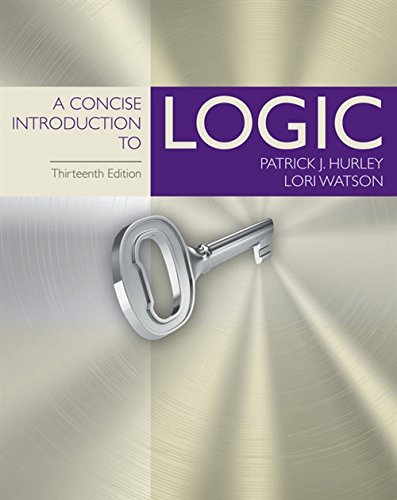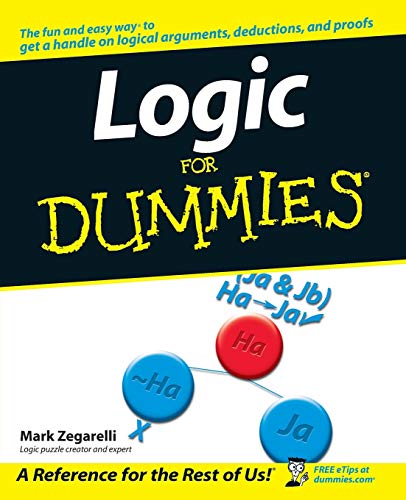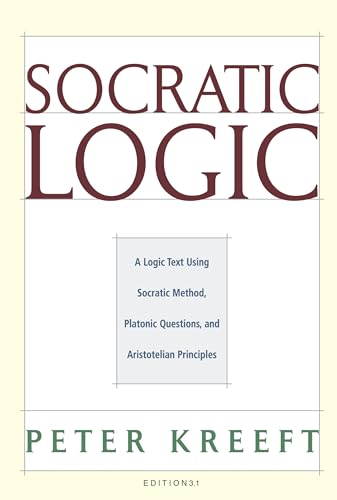Learning to construct compelling arguments is a valuable life skill. It is a fundamental ability common to math, physics, literature, psychology, and other academic endeavors.
The following are top-rated books to improve your logical thinking. From introductions to comprehensive textbooks, they will teach you to solve problems, make important decisions, generate ideas, and set realistic goals.
- Top pick: Introduction to Logic (14th edition)
- Runner up: A Concise Introduction to Logic
- Also great: Logic: A Very Short Introduction
The book tackles logic’s basic methods and techniques, highlighting the study’s relevance to daily life.
There are three main sections – logic and language, deduction, and induction. Some of the topics include fallacies, syllogisms, predicate logic, and causal reasoning.
The authors explain concepts in great detail, providing clear and accurate examples to aid learning. The descriptions are simple enough for someone without a background in logic.
Still, the book can be a challenging reference material for those who are well-versed.
You will find the chapter summaries and charts appropriate and helpful.
While the illustrations act as informative supplements and support to explanations, they also make the book visually stimulating.
This edition of the textbook includes new sets of exercises complete with easy-to-follow solutions. Each drill applies to real-world cases of scientific inquiry.
Accurate and accessible, “Introduction to Logic (14th edition)” manages to deliver a daunting subject in an easy-to-digest manner.
It is definitely an excellent aid to sharpen your argumentative skills.
The book presents an accessible exposition on formal and informal logic basics, demonstrating how they can be connected to real-life problems.
You will find the central concepts meticulously explained with graphic illustrations for easy retention. Key terms are introduced in boldface type.
Hurley and Watson offer concise explanations supported by clear examples, mostly taken from newspapers and magazines to lend them authenticity. They reinforce learning and provide support when answering drills.
The book has over 2,700 exercises, arranged from simple to complex, to give you plenty of time to practice your logic skills.
There are dialogue exercises to help illustrate how logic principles are applied to real-life situations.
At the end of each chapter, you will find summaries and practice tests to facilitate review.
“A Concise Introduction to Logic” is accompanied by a multimedia interactive tutorial program offered through MindTap. They contain thousands of audio files and additional exercises to help improve your reasoning and critical-thinking skills.
If you are looking for a comprehensive and reader-friendly primer to logic, this book will not disappoint.
The book discusses the fundamentals of formal logic in simple, non-technical terms, illustrating the field as an essential part of modern philosophy.
Priest chooses a more philosophical approach in his exposition, exploring how logic deals with concerns like the reality of time, paradoxes of probability, and the existence of God.
Some of the chapters in the book are:
• Descriptions and Existence: Did the Greeks Worship Zeus?
• Necessity and Possibility: What Will be Must be?
• The Future and the Past: Is Time Real?
• Decision Theory: Great Expectations Logic Decision Theory
Fun and accessible, “Logic: A Very Short Introduction” is an engaging read that does not sacrifice important content. Graham articulates his thoughts in a straightforward manner you will have no difficulty absorbing.
If you are looking for a textbook in logical reasoning, this is not for you. The book serves as a teaser to boost your interest and read more about the topic elsewhere.
The book covers the essentials of logic and explains how logic is central to human intelligence. There is also an extensive discussion on the danger of illogical thinking and its many sources.
McInerny explains that to master logical thinking, you also need to understand illogical thinking to protect yourself from incoherent and deliberately misleading interpretations.
According to him, humans oftentimes use different irrational tactics in place of practical reasoning. These can be diversions, red herrings, or simplistic reasoning.
The book has five parts, each with subtopics supported by precise analysis and focused insights.
• Preparing the Mind for Logic
• The Basic Principles of Logic
• Argument: The Language of Logic
• The Sources of Illogical Thinking
• The Principal Forms of Illogical Thinking
Straightforward and precise, “Being Logical: A Guide to Good Thinking” is written in plain English that you will have no trouble understanding. The examples are accessible and relatable.
A highly readable book, it is recommended to anyone interested in the fine points of thought and expression.
“A Rulebook for Arguments (Fifth Edition)” discusses the basic principles of theory construction, as well as the different forms of argument, including example, causal and deductive.
The common fallacies and drawbacks in the process of a logical argument are also covered.
Weston prescribes a detailed course in arguments, stating the need for a reasonable discourse in public debates and academic writing.
You will learn to make concise arguments by creating a reliable premise, straightening out ideas, and distinguishing truths from a vast sea of misinformation.
This fifth edition contains a new chapter on public debate, complete with rules for ethics and etiquette. The updated examples are easy-to-digest, realistic, and cover a wide range of disciplines.
If you want to improve your thinking skills and acquire a keen sense of fact-checking, “A Rulebook for Arguments (Fifth Edition)” is the book you need.
The book explains the different logical concepts and processes in easy-to-understand prose, from paradoxes and proofs to semantic structures and symbolic logic.
Other topics covered include:
• syllogisms
• constructing proofs and refutations
• propositional and predicate logic
• modal and fuzzy logic
• deductive and inductive reasoning
Zegarelli shows how logic concepts are more conventional than you think. He expounds that logic is everywhere, from watching your favorite television show to deciding which clothes to wear.
The book incorporates real-world examples for easy understanding of each concept. Procedures are explained step by step to illustrate how to build and prove logical arguments.
You will even get valuable tips on how to pass logic exams.
You can also use fun logic problems and proofs to convey what you have learned throughout the book.
If you are a college student, “Logic For Dummies” is an excellent learning tool. The book’s plain language and appropriate pacing will keep learning enjoyable and stress-free.
The book presents polemics in the philosophical applications and suggestions of formal symbolic logic, surveying key trends and offering unique insights.
Each commissioned essay was written by international contributors from various logical and philosophical perspectives.
These specialists dig deep into the recent issues intersecting logic and analytic philosophy, their stance valuable in advancing research and philosophical discussions.
There are 14 chapters in the book. Each section features contributors explaining central ideas in their particular field. Some of them are:
• Truth and Definite Description in Semantic Analysis
• Metatheory and the Scope and Limits of Logic
• Inductive Fuzzy and Quantum Probability Logics
• Mechanization of Logical Inference and Proof Discovery
Jacquette masterfully unites multiple experts to share their pieces on a common topic.
You will appreciate the rich examination of philosophical logic, from history and philosophy to applications. There is also plenty of solid logic analysis throughout the compilation.
Comprehensive and prolific, “A Companion to Philosophical Logic” is a first-class handbook for both students and professional researchers of the study.
The book recognizes the connection between reality and language, demonstrating how the solutions to most theoretical problems are vital to linguistic analysis.
It also defines the limits of science.
The book centers on the notion that the laws of science, though not absolute, are critical to reaching the truth. It is the philosophy that renders science service, articulating if its theories and hypotheses are correct.
Meanwhile, the role of language is to provide a “picture of reality.”
Wittgenstein’s inquiry begins with a narrative on ontology and the state of world affairs, deftly progressing to answering questions on how language works.
Logic is used to examine propositions, tautologies, and contradictions.
Brilliant and often cryptic, “Tractatus Logico-Philosophicus” is a tour de force that stirs the imagination until today.
Absorbing and straightforward, it is an ideal text for college students.
If you want to read a book that adeptly combines perspectives in language, logic, and philosophy, Wittgenstein’s masterwork will satisfy you.
The book focuses on logical fallacies, defined as errors in reasoning. It explains the most common misconceptions, types of lies, and techniques for exposing fallacious reasoning.
This latest edition includes additional logical fallacies, complete with updated, original examples.
You will find the fallacies listed in alphabetical order for easy mapping. Each section indicates the fallacy’s name and alternate label, easy-to-understand description, logical form, and illustrative examples.
The practice drills and question and answer portions are beneficial. Bennett integrates information from the philosophies of language, science, and religion.
The book’s humorous approach aids in reinforcing the importance of critical thinking in daily life.
As you read along, you will notice how Bennett’s exposition helps significantly improve how you rationalize and make decisions.
Clear and comprehensive, “Logically Fallacious” is an excellent resource for students, debaters, and those who want to improve their skills in reasoning.
“Socratic Logic: A Logic Text using Socratic Method, Platonic Questions, and Aristotelian Principles” offers superior analysis on how logic applies to your life, from religion to modern ethics.
The topics covered include material fallacies, arguments, induction, syllogism, changing proposition, and contradiction. There are also discussions on practical and philosophical applications of logic.
You will learn to analyze, interpret, construct compelling arguments, and spot hidden assumptions using the Socratic method.
The additional chapters discuss new philosophical issues from a rational, realistic point of view.
Kreeft includes new exercises with complete examples. Reader-friendly and straightforward, the explanations are engaging and light, designed for classrooms and do-it-yourself sessions.
“Socratic Logic” is an excellent primer for reading other philosophical classics. It models Socrates as the ideal teacher and philosopher for beginners.
While highlighting the validity of Aristotelian logic, it unwittingly exposes the flaws of contemporary symbolic logic.
It is a brilliant book for anyone seeking to understand how to think more critically.
The book provides a wide range of tools to demonstrate how critical thinking applies to daily life.
While examining the basics of logic and argumentation, it tackles frequently overlooked topics such as inference, visual reasoning, and evidence and authority.
Well-written and engaging, it contains a lot of integrated exercises and self-assessment quizzes you can use to facilitate review.
It is also very illustrative. You will find the information boxes fun, filled with exciting information on logic and critical reasoning.
Using simple language, Vaughn explains areas of human reasoning in a clear and accessible manner. He also repeats key concepts of easy retention.
One of the most readable logic textbooks, “The Power of Critical Thinking” is appropriate for freshmen college students.
If you are at a more advanced level, the text is still an excellent reference material.
It is one of the best books in logic that should be on your shelf.











